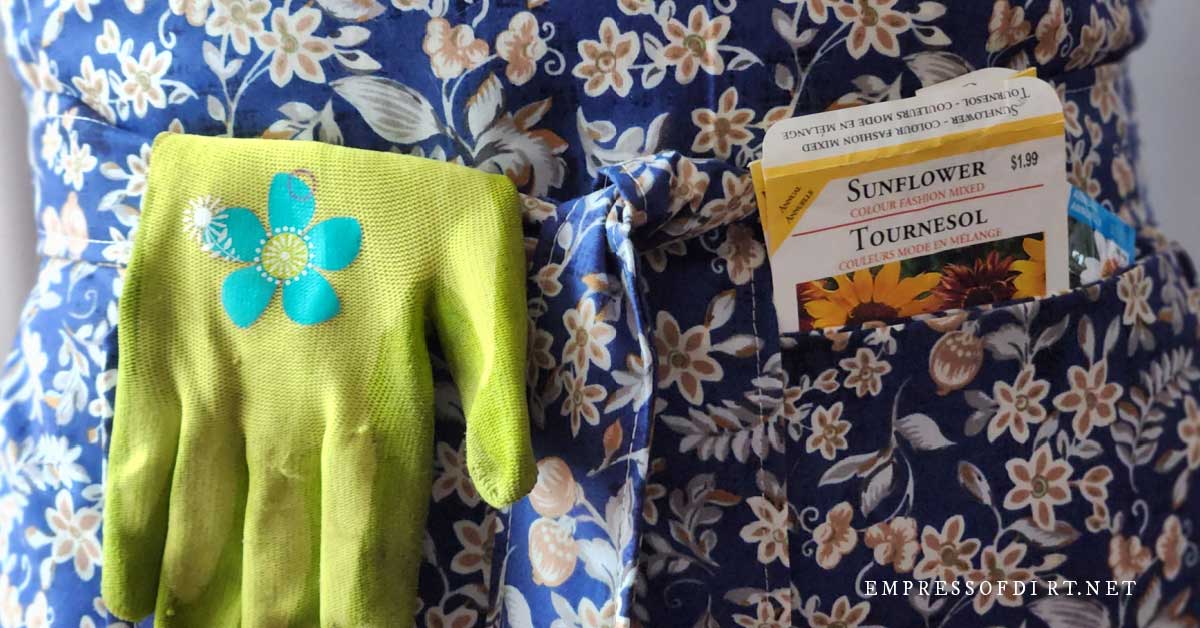[ad_1]
This comfortable garden apron is an easy sewing project, perfect for beginners. It requires minimal fabric, can be sewn in an afternoon, and includes a free pattern.
If you enjoy simple sewing projects, this gardening head scarf is another favorite for hot summer days.

Sew a Garden Apron

This basic apron pattern can be used to sew aprons perfect for gardening, indoor seed starting, housekeeping and more.
If your apron is for outdoor jobs that get muddy or wet, choose a tougher fabric like denim or canvas or outdoor curtain or upholstery fabric with some water-resistance.
For other tasks, a crisp cotton fabric—either single or double-layers—works nicely.
One of my favorite aprons is made from a lined table cloth (like the ones at the dollar store). It works nicely to protect my clothes when I’m painting or staining DIY projects.
About This Apron Design
Size
This apron is designed to fit a wide range of sizes but I always recommend checking the measurements to ensure it suits your needs.
Design


This apron is a classic design using one piece of fabric to form the bib and skirt.
There are two sets of ties for the neck and waist.
The waist ties are quite long and intended to wrap around the body and tie at the front. If you prefer shorter ties, you can always adjust them.
The pocket is made from a double thickness of fabric secured to the front of the skirt.
Once you’ve made your first apron, I encourage you to add extra features like clips, snaps, or buttons for the ties, belt loops, or a zippered pocket for your phone, and any embellishments your heart desires like embroidery or patchwork.
Instructions
Materials
- 1.5 yards (54-inches long) fabric (44-inches wide)
- thread
Supplies
- Sewing machine & needles (suited to your fabric)
- Cutting mat
- Rotary cutter
- Ruler
- Scissors
- Pins or clips
- Tailor’s chalk or vanishing fabric pen
- Masking tape & marking pen
- Iron and ironing mat
- Free pattern – apron bib template – see Resources
1Cut Fabric Pieces


Fold fabric
- Fold fabric lengthwise, wrong sides together.
Draw cut lines
Use tailer’s chalk or a vanishing fabric pen to mark your cut lines.
- Apron (on fold): 34-inches long x 14-inches wide.
- Waist ties: 54-inches long x (approximately) 7-inches wide (fabric is folded = 2 pieces).
- (2) Neck ties (on fold): 14-inches wide x 2-inches long ( =28-inches wide unfolded).
- Pocket (on fold): 14-inches wide x 8-inches long (=16-inches unfolded).
Cut fabric pieces
Use a rotary cutter and mat or fabric scissors to cut out the fabric pieces.
- Cut (2) waist ties 54 x 7-inches. With fabric folded, you just need to cut once. Also trim off any selvages and ensure your two waist tie pieces are the same width and length.
- Cut apron 34 x 14-inches wide (on the fold). Actual piece will be 34 x 28-inches.
- Cut (2) neck ties: 14 x 2-inches. Each tie piece will be 28 x 2-inches.
- Cut pocket: 14 x 8-inches long. Actual piece will be 28 x 8-inches.
2Label Fabric Pieces


Label each fabric piece. I use painting tape and a sharpie marker.
3Cut Apron Bib Curve


Fabric
To create the apron bib, start with the apron fabric (34 x 14) right side up with the fold on your right.
Cut the Curve
Print out the free pattern (see Resources) or freehand the curve based on the measurements shown above.
The pattern is a pdf file and uses five 8.5×11-inch pieces of paper which you will tape together.
The top of the bib should be 5-inches wide (on the fold = 10-inches wide).
The bottom of the bib is 13-inches below the top edge of the bib.
You’re just cutting the curve here and nothing else.
Here it is after cutting:


The fabric piece with the blue APRON label on it (above) is not needed and you can set it aside.
4Make Neck Ties


The easiest way to make ties is the double fold method. This hides raw edges.
We start with two pieces of fabric 28-inches long and 2-inches wide to make two ties.
With right side down, fold each tie piece in half lengthwise (bringing wrong sides together) and press it in place. This middle crease will be your guide line.
In the photos (above):
- The fabric has been folded lengthwise (wrong sides together) and pressed, and the ends are also folded in ( a half-inch) and pressed in place.
- Next, fold and press each long side (a half inch) in to the middle.
- Your tie is now 1″inch wide with one step to go.
- Fold in half one more time and press in place.


Stitch the neck ties shut by topstitching near the edges as shown in photo. I use a zipper foot for this.
5Make Waist Ties
I mentioned in the introduction that the waist ties are intended to wrap around the body and tie at the front. I do this because they’re very comfortable this way!
You might want them shorter. If so, you can adjust the size now or later.
To make the waist ties, we start with two pieces of fabric each approximately 54 x 7-inches. If you haven’t already, trim off any selvages.
The waist ties are created the same way we made the neck ties, but these are larger.
With right side down, fold and press each tie in half lengthwise (bringing wrong sides together) to form a middle crease.
Fold and press the ends in, approximately a half-inch each.
Fold and press each long edge to meet at the middle crease, then fold again.
Your ties are now 4 layers thick and approximately 1 3/4-inches wide (1.75-inches).


Topstitch all the way around as shown in photo above, approximately 1/4-inch from the edges.
6Hem Apron Bib Curves & Top


The hems around the bib use an inch of fabric total—a half-inch for the first fold plus a half-inch for the second fold.
Place your apron fabric wrong side up as shown above.
Fold (a half inch) and press each of the two curved edges.
Then, use small scissors to clip the folded fabric every inch or so, careful to stay 1/8-inch away from the fold (see next photo). This will make the hem lie nice and flat.


Next, fold (another half-inch), press, and pin (or clip) to hold the hems in place.
Sew these hems in place by topstitching (on the right side of the fabric) approximately 1/4-inch from the edge.
7Hem Apron Skirt Sides & Bottom


With the curves hemmed, it’s time to hem to skirt sides.
Again, with your apron fabric right side down, fold and press a half inch hem, and then do it again to hide raw edges.
Hold everything in place with pins (or clips) and topstitch in place on right side of fabric using a straight stitch 1/4-inch from the edge.
Next, before creating the bottom hem, with wrong side facing up, fold in each corner (as shown below) and press in place. This will make a tidier hem.


The bottom hem uses two inches of fabric (one-inch plus one-inch) double folded.
With apron fabric right side down, fold bottom hem one-inch (wrong sides together), press, and fold again (one-inch). Press and pin (or clip) in place.


Working on the right side of the fabric, topstitch the hem straight across the apron, approximately 3/4-inch from the bottom. Press in place.
Alternately, you could hem the seam by hand.
We have now hemmed the entire apron.
8Make Pocket


As shown in Step 1, the pocket fabric is cut on a fold. Open it up and place right sides together with the 8-inch fold on your right.
The outer pocket will be two layers thick for sturdiness.
See the diagram (above) for these steps:
- Sew a half-inch seam all the way around except for the section noted in photo 1 (above).
- Clip off each of the corners, close to but not touching any stitches.
- Turn fabric right side out and press. The long side with the gap where we did not stitch will form the bottom edge of the pocket.
8Attach Pocket


Ignore the ties in the photo (above)—it’s best to sew them on last, after the pocket is attached so they don’t get in the way.
To place your pocket, with the apron fabric right side up, locate the waist of the apron and mark the center point.
Also mark the center point of the pocket.
Pin the pocket onto the apron skirt with the top edge of the pocket approximately 2-inches below the waist line, centered on the skirt.
Topstitch the pocket to the apron along three sides as shown in the photo (above). Reinforce your stitches (by backstitching) at each end and corner.
Then topstitch down the middle to divide the pocket in two.
9Attach Ties


Sew Neck Ties to Bib
With bib fabric right side up, place a neck tie behind the top bib corner, overlapping approximately one inch. Pin in place.
Topstitch in place. I like to stitch a rectangle with an X inside.
Repeat for the second neck tie.
Next we’ll attach the waist ties.


Sew Waist Ties to Skirt
With apron fabric right side up, place a waist tie behind skirt (just below a side bib curve), overlapping approximately 1 3/4-inches (1.75-inches). The waist tie should be a scant 1/8-inch below the corner.
Topstitch the waist tie in place. I stitch a rectangle with an X inside ensuring the waist tie is firmly secured.
Repeat for 2nd waist tie.
Adjustments
Try on the apron and adjust the waist ties if desired. If they are too long, just clip the ends, fold in the raw edges, and topstitch in place.
Finished Apron
Here is the finished apron.


Again, I really like the wrap-around waist ties but to each her own.


Once you’ve made one, adapt the design however you like.
I like to keep an apron handy everywhere I work—whether it’s in the home or garden—so I can protect my clothes—and get on with the work at hand.
Resources
Empress of Dirt
APRON BIB TEMPLATE


Enter your email to save the file.
Joining our free newsletter list is optional at checkout.
- Sewing Machine | For this project I used my Singer Quantum Stylist 9960.
~Melissa the Empress of Dirt ♛
[ad_2]
Source link

